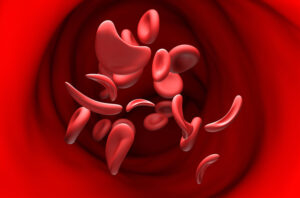Patients with sickle cell disease (SCD) often require chronic red blood cell exchanges. The American Society for Hematology recommends matching for ABO, Rh (C, E, C/c, E/e) and K antigens for patients with SCD. Nevertheless, many of these patients develop alloantibodies, necessitating hundreds or even thousands of Rh-negative RBC units over their lifetimes. Anti-D alloantibodies may develop in D+ patients who receive D+ units, likely due to exposure to an altered Rh protein on donor RBCs. Researchers, however, have noted that these alloantibodies are usually only detectable for a few months. Considering this, researchers tested whether five D+ patients with SCD who had developed unexpected anti-D could be safely transfused with D+ units after anti-D alloantibodies were undetectable in their plasma for at least six months. Since all five patients required chronic red cell exchanges, each patient received one D+ unit (and the remainder Rh-negative) for two consecutive exchanges, and one D+ unit was added for each subsequent exchange for a maximum of six D+ units per patient. Each patient received 11 to 22 units of D+ blood for a total of 72 D+ units transfused to five patients with no anti-D alloantibody restimulation. Although further research is needed, RH genotyping of D+ units may help reduce the demand for Rh-negative units.
References:
- Chou ST, Mewha J, Friedman DF, Lazariu V, et al. Genotyped RhD+ red cells for D-positive patients with sickle cell disease with conventional RHD and unexpected anti-D. Blood 2024; 144 (19): 2045–2049
- Robitaille N and Leiva-Torres GA. Are D+units safe for D+ patients with anti-D?. Blood 2024; 144 (19): 1982–1983

